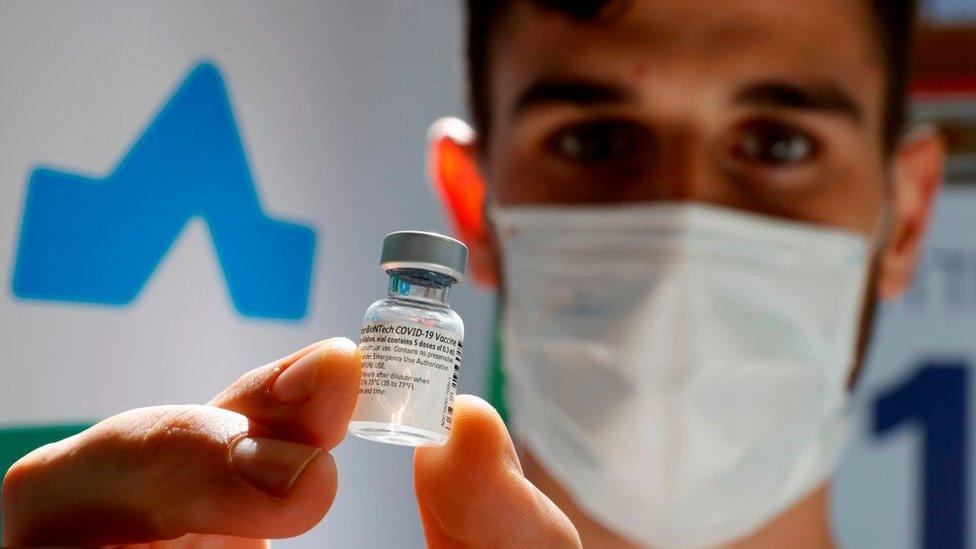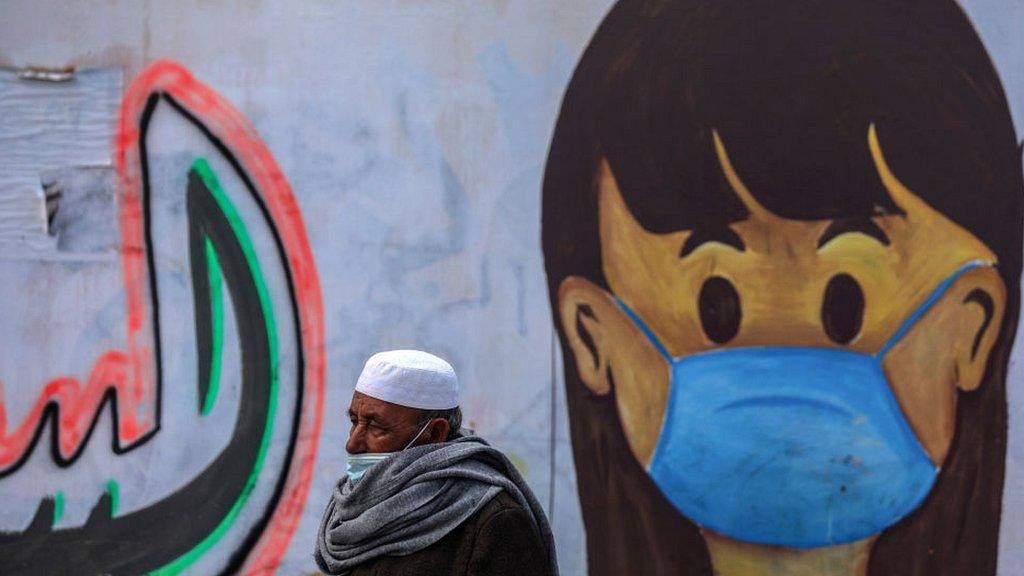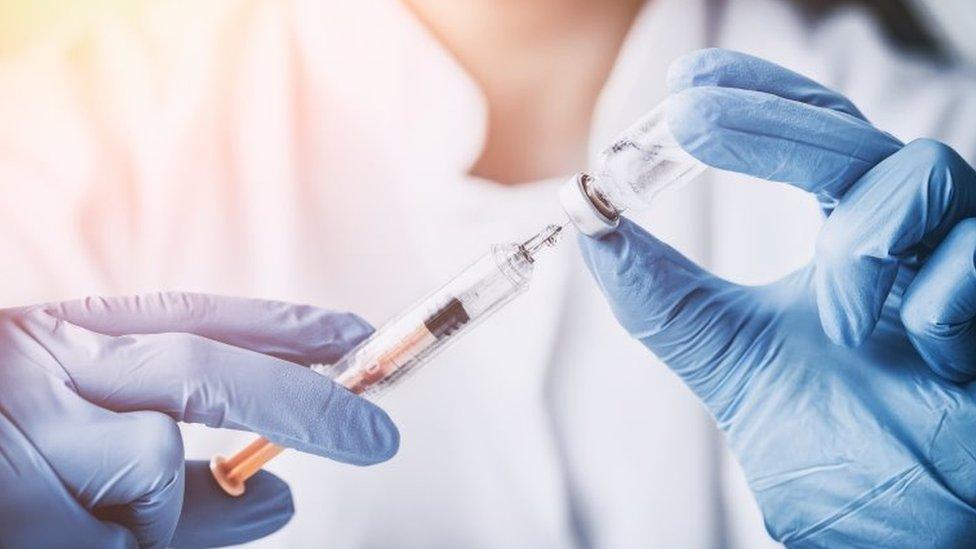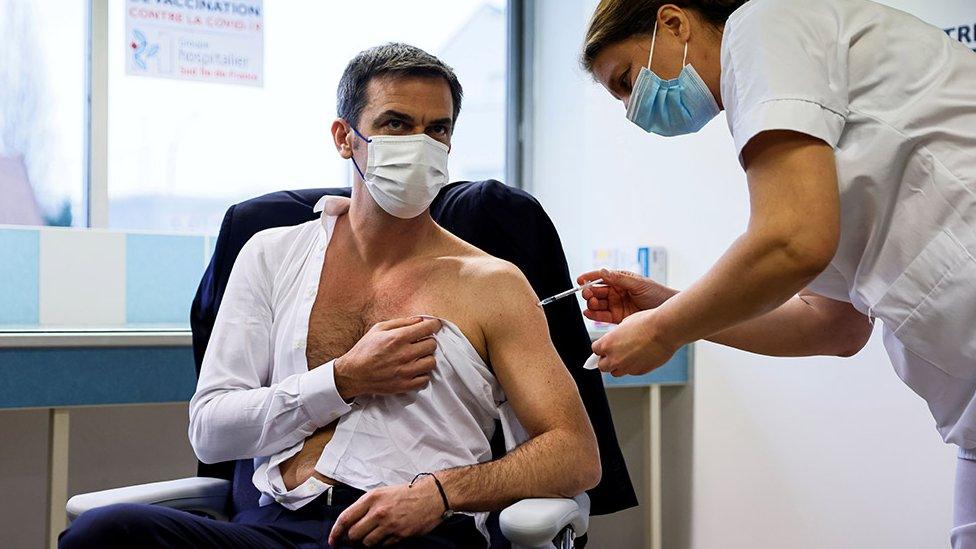Covid: Israel's vaccine rollout linked to infection fall
- Published

Israel's vaccination programme is showing signs of working to drive down infections and illness in the over-60s.
The fall appears to be most pronounced in older people and areas furthest ahead in their immunisation efforts.
This suggests it is the vaccine, and not just the country's current lockdown, taking effect.
Israeli Ministry of Health (MoH) figures show 531 over-60s, out of almost 750,000 fully vaccinated, tested positive for coronavirus (0.07%).
And far fewer fell ill, with 38 becoming hospitalised with moderate, severe or critical disease - a tiny proportion.
The MoH assessed the medical records of almost a million people in total - 743,845 of whom were over the age of 60 - until at least seven days after they received a second dose of the vaccine.
There were three deaths in vaccinated over-60s - although it is possible they contracted the infection earlier, before their immunity had time to build.
Before the vaccine had time to take effect, more than 7,000 infections were recorded, just under 700 cases of moderate to critical illness and 307 deaths.
The MoH data suggests infections and illnesses fell consistently from 14 days after receiving the first jab onwards.

Delayed dose strategy
While the biggest fall observed was in people seven days after their second dose of the vaccine, this cannot be used as evidence for or against the wisdom of the UK's strategy of delaying second doses.
Israel has consistently given people their first and second doses no more than three weeks apart, but the first dose isn't expected to provide protection for at least two weeks.
So it is not possible by looking at this data to untangle the impact of the second dose from the first dose starting to kick in.
The first dose takes longer to show any effect as it primes the immune system to start recognising and fighting off the virus.
Israel has delivered five million doses of the vaccine to a population of about nine million - and about one million people have received two doses.
The jury's still out on whether the vaccine completely stops people from carrying, and passing on, the virus.
So for now, while many people remain unvaccinated, those who have had the jab are still being told to socially distance and wear masks.
Lockdown a factor?
The MoH's data only looked at infections and illness in vaccinated people - it did not involve a control group of unvaccinated people as a clinical trial would.
But a team of researchers at the Weizmann Institute of Science, Tel-Aviv University, and Technion - Israel Institute of Technology - have attempted to pin down whether the observed fall in cases is down to the vaccine rather than just the effect of lockdown restrictions.
Prof Malka Gorfine, Hagai Rossman, Prof Eran Segal, and Dr Uri Shalit analysed national data by age and city.
They identified bigger falls in infections and hospitalisations both in the over-60s, who were vaccinated first, and in the cities which vaccinated the largest proportion of their populations earliest.
These relative changes were not seen in earlier lockdowns.
This gives early but encouraging signs the falls can be linked to the vaccine, and not just to current restrictions.
Separately, Israel's second-largest healthcare provider Maccabi published figures showing 66 people out of a group of 248,000 vaccinated (0.03%) caught the Covid-19 virus, more than a week after receiving the second dose of the vaccine.
Of those 66, all had mild symptoms and none were hospitalised.
Unlike the MoH, Maccabi compared the infection rate with 900,000 unvaccinated people with a similar demographic profile. In this group during the same time period, 8,250 caught Covid - more than 30 times as many.
They estimated the vaccine was 92% effective when used in a population - very similar to the 95% Pfizer found in a controlled clinical trial.
Follow Rachel on Twitter, external
Related topics
- Published22 March 2021

- Published1 February 2021

- Published2 April

- Published21 June 2021
